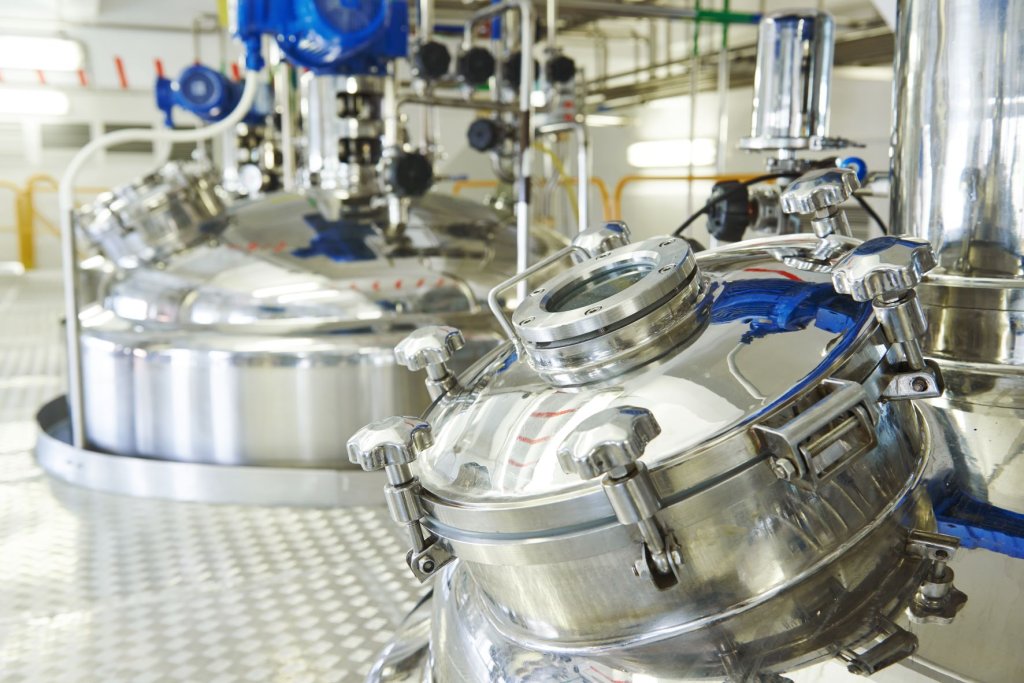Why Materials Matter
Piedmont Plastics carries a range of performance plastics resistant to Clean-in-Place (CIP) and Sanitize-in-Place (SIP) chemicals. These chemicals are commonly used by food and beverage processing facilities, pharmaceutical companies, and the cosmetics sector, and plastics perform a necessary function in their manufacturing and processing facilities.
The CIP and SIP Process
Although all plants routinely clean and sanitize processing equipment, there is no set procedure. The CIP (or SIP) recommendations for chemical ratios and temperatures are specific to each plant.
CIP units clean vessels, pipes, mixing tanks, pumps, valves, and processing equipment multiple times a day. In its basic form, the CIP procedure entails passing an alkaline wash at a high velocity or high turbulence through the processing machinery. An acidic chemical wash comes next. Specific systems sometimes omit the final rinse because they use electrolyzed oxidizing water (EOW) instead of chemical wash. Traditionally, however, a final flush involves rinsing the entire system with a sanitizer.
CIP and SIP Material Requirements
The following qualities should be taken into account when choosing materials for CIP applications:
- Resistant to chemicals involved in production and cleaning
- Resistant to moisture
- Heat resistant
- Resistant to wear and friction
- Can be easily fabricated, machined, bonded, or welded
- Meets individual industry compliance requirements
Because performance plastics meet all of these requirements, they are an excellent material choice for CIP and SIP applications.
Why You Should Consider Plastics Over Metals
Stainless steel has long been a popular material for processing and CIP machines. While stainless steel can withstand heat and chemicals, it also rusts, and, to work properly, metals also require lubricants. These lubricants can attract particles that might contaminate a CIP system and lead to contamination of the final product.
While heat may not be generated during some processing operations, it is always generated during CIP operations. SIP systems can be even hotter. Therefore, materials used in processing equipment must be able to withstand temperature changes during production and cleaning.
Plastics that comply with FDA regulations can exhibit better corrosion and chemical resistance than metals. They also feature superior heat tolerance and can make excellent seals. These are valuable characteristics as processing facilities continuously strive to reduce the exposure of operators to hot temperatures and corrosive chemicals.
Popular Plastics for Food Processing
UHMW, acetal, and nylon are a few materials that are frequently utilized in food processing. These engineering plastics provide a dependable service life, a reasonable price, and meet the minimum criteria for CIP systems.
Other, more expensive materials include high-performance plastics such as PET, PEEK, and fluoropolymers like polyvinylfluoride (PVF) and polytetrafluoroethylene (better known as TeflonⓇ).
It’s important to remember that various plastics perform differently under some conditions. For instance, PET is frequently used in applications for food processing machinery, but PET might not be the best material if the part is frequently in contact with a base solution. To determine the best polymer for your processing, cleaning, and sanitizing needs, contact one of the materials specialists at Piedmont Plastics for more information.
What To Consider When Using Plastics With CIP and SIP Chemicals
While plastics can perform as well as or even better than stainless steel or other metals, you should consider the following factors when selecting a plastic for a particular application.
Durability
Manufacturing and processing equipment needs to withstand considering friction and abrasion. It is assumed that plastics used in CIP applications will be robust. Even though these plastics are made to withstand heavy use, some FDA-compliant plastics come with bright food-safe colors or x-ray-detectable additives to make it simple to spot contaminated products.
Moisture Resistance
Food and beverage production plants need materials that withstand hot water and steam, but moisture can damage some polymers. UHMW is popular for wear components but not steam. Some plastics distort and hydrolyze when heated.
Plastics absorb water at different rates. Some plastics in submerged or steam conditions absorb water and lose tolerances. Some CIP systems use sprayer systems, but the absorption rate may not be a concern depending on the frequency and duration of moisture exposure.
Compliance
Materials must meet FDA requirements when processing items for human consumption. Similar conditions apply to pharmaceuticals, cosmetics, medical device manufacturing, semiconductors, and more. Many plastics have no problem meeting most regulatory requirements.
Machinability
Materials easily machined, manufactured, welded, or bonded are a great advantage to CIP systems. Piedmont Plastics’ materials specialists can help answer any questions you might have about complicated machining designs, fabrication that needs precise tolerances, and dimensional stability of materials.
CIP and SIP Solutions at Piedmont Plastics
Performance plastics work well for multiple cleaning and sanitizing processes in food processing and product manufacturing. Piedmont Plastics provides a variety of materials perfect for your needs. Contact one of our materials specialists today for additional information on how we can help with your next project.
